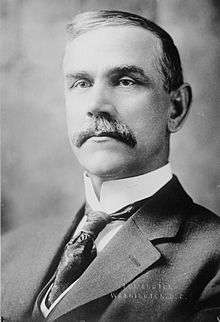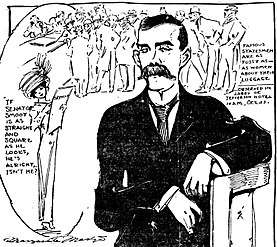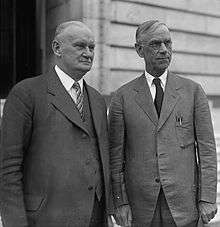Reed Smoot
| Reed Smoot | |
|---|---|
 | |
| Quorum of the Twelve Apostles | |
| April 8, 1900 – February 9, 1941 | |
| Called by | Lorenzo Snow |
| LDS Church Apostle | |
| April 8, 1900 – February 9, 1941 | |
| Called by | Lorenzo Snow |
| Reason | Death of Franklin D. Richards |
| Reorganization at end of term | Harold B. Lee ordained |
| United States Senator from Utah | |
| In office | |
| March 4, 1903 – March 4, 1933 | |
| Predecessor | Joseph L. Rawlins |
| Successor | Elbert D. Thomas |
| Political party | Republican |
| Personal details | |
| Born |
Reed Smoot January 10, 1862 Salt Lake City, Utah Territory, United States |
| Died |
February 9, 1941 (aged 79) St. Petersburg, Florida, United States |
| Resting place |
Provo City Cemetery 40°13′30″N 111°38′40″W / 40.225°N 111.6444°W |
| Alma mater | Brigham Young Academy |
| Spouse(s) |
Alpha M. Eldredge Alice Taylor Sheets |
| Children | 7 |
| Parents | Abraham O. and Anne K. Smoot |
Reed Smoot (January 10, 1862 – February 9, 1941) was a businessman and apostle of The Church of Jesus Christ of Latter-day Saints (LDS Church) when he was elected by the state legislature to the United States Senate in 1902; he served as a Republican senator from 1903 to 1933.[1] From his time in the Senate, Smoot is primarily remembered as the co-sponsor of the 1930 Smoot–Hawley Tariff Act, which increased almost 900 American import duties. Thomas Lamont, a partner at J.P. Morgan at the time said, "That Act intensified nationalism all over the world".[2] The Smoot-Hawley Tariff Act is widely regarded as one of the catalysts for the Great Depression.[3]
Smoot was a prominent leader of the LDS Church, chosen to serve as an apostle in the Quorum of the Twelve Apostles in 1900. His role in the LDS Church (together with rumors of a secret church policy continuing polygamy and a secret oath against the United States)[4] led to a lengthy controversy of four years after he was elected to the Senate in 1903. A Senate committee investigated his eligibility to serve, known as the Reed Smoot hearings, and recommended against him, but the full Senate voted to seat him.[4] Smoot continued to be re-elected to successive terms until he lost his seat in the 1932 elections. Smoot returned to Utah in 1933. Retiring from politics and business, he devoted himself to the church. At the time of his death, he was third in the line of succession to lead the LDS Church.[1]
Early life, family, and religious activity
Smoot was born in 1862 in Salt Lake City, Utah Territory. He was the son of Mormon pioneer from Kentucky and Iowa, Abraham O. Smoot, who served as mayor of the city from 1856 to 1862. His mother was Anne Kristina Morrison Smoot, also known as Anne Kirstine Mauritzen before her marriage. Anne Kristina Morrison Smoot was Smoot's father's fifth wife of six plural marriages and 27 children, three of whom Abraham O. Smoot adopted.[5]:99–102 The family moved to Provo, Utah, when his father was called by Brigham Young to head the stake there. Smoot attended the University of Utah and graduated from Brigham Young Academy (now Brigham Young University) in Provo in 1879. Following which, Smoot served as a Mormon missionary in England. After returning to Utah, Smoot married Alpha M. Eldredge of Salt Lake City on September 17, 1884. They had six children together.[1] Thereafter, Smoot became a successful businessman in the Salt Lake City area. In 1895, he became increasingly involved in the hierarchy of the LDS Church, advancing in authority. On April 8, 1900, Smoot was ordained an LDS Church apostle and member of the church's Quorum of the Twelve Apostles.[1]


United States Senate
After becoming an apostle in 1900, Smoot received the approval of LDS Church president Joseph F. Smith to run for office in 1902. He had joined the Republican Party.[7]
Smoot was elected by the Utah legislature to the United States Senate (58th Congress) on January 20, 1903, as a Republican Senator, representing the state.[8] Smoot was introduced to the United States Senate by Utah's senior U.S. Senator, Republican Thomas Kearns, a Catholic who had been elected in 1901 over Smoot. Two years later Smoot ran again and was elected to the Senate.[9]:12
Controversy over religious affiliation
Smoot's election sparked a bitter four-year battle in the Senate on whether Smoot was eligible and should be allowed to serve. Many senators (and Americans) were suspicious of the LDS Church because of its earlier polygamous practices. In addition, some thought Smoot's position as a Mormon apostle would disqualify him from representing all his constituents. Many were convinced that his association with the church disqualified him from serving in the United States Senate. Only a few years earlier, another prominent Utah Mormon, B. H. Roberts, had been elected to the House of Representatives. He was denied his seat on the basis that he practiced plural marriage (polygamy), which was illegal in Utah as well as all other states of the Union.[9]:13–20
The LDS Church had officially renounced future plural marriages in an 1890 Manifesto, before Utah was admitted as a state. However, the Salt Lake Tribune reported that church leaders continued to approve secretly of new, post-Manifesto plural marriages.[10]:377 Because of the controversy, the Senate began an investigation into Smoot's eligibility.[9] The Smoot Hearings began on January 16, 1904. The hearings included exhaustive questioning into the continuation of plural marriage within the state of Utah and the LDS Church, and questions on church teachings, doctrines and history. Although Smoot was not a polygamist, the charge by those opposed to his election to the Senate was that he could not swear to uphold the United States Constitution while serving in the highest echelons of an organization that sanctioned law breaking.[4]

Some opponents claimed that temple-attending Latter-day Saints took an "oath of vengeance" against the United States for past grievances. As a leader of the LDS Church, Smoot was accused of taking this oath, which he denied. Although the majority of the investigative committee recommended that Smoot be removed from office, on February 20, 1907, the two-thirds majority required to expel Smoot failed and he was allowed to keep his seat.[4]

Political career
Senator Smoot (Republican, Ut.)
Is planning a ban on smut.
Oh rooti-ti-toot for Smoot of Ut.
And his reverend occiput.
Smite, Smoot, smite for Ut.,
Grit your molars and do your dut.,
Gird up your l__ns,
Smite h_p and th_gh,
We'll all be Kansas
By and by....
Nash, Ogden (January 11, 1930), "Invocation", The New Yorker: 30 .
Smoot was reelected in 1908 and continued to be re-elected to successive terms until 1932, serving in the Senate until March 1933. A constitutional amendment mandated the popular election of US Senators after 1913. He was defeated in the 1932 election.[1]
In 1916, William Kent was the lead sponsor in the House of Representatives of legislation to establish the National Park Service. Smoot sponsored the similar Senate bill. The legislation passed the House of Representatives on July 1, 1916, passed the Senate on August 5, and was signed by U.S. President Woodrow Wilson on August 25, 1916. The agency was placed within the cabinet Department of Interior.[12]
Smoot was Chairman of the Senate Finance Committee from 1923 to 1933, and served on the Senate Appropriations Committee.[13]:5 He became active in the national Republican Party and served as a delegate to the Republican national convention every four years between 1908 and 1924. He was Chairman of the 1928 Resolutions Committee at the 1928 Republican National Convention and Chairman of the Republican Senatorial Campaign Committee.[5]
Smoot was a co-sponsor of the Smoot-Hawley Tariff Act in 1930, which raised U.S. import tariffs on over 20,000 dutiable items to record levels. Many historians believe that it exacerbated the Great Depression. U.S. President Herbert Hoover signed the act into law on June 17, 1930.[2][14]
Smoot served five terms before being defeated in the 1932 election by Democrat Elbert D. Thomas. After his unsuccessful reelection campaign, Smoot moved back to Salt Lake City. He retired from active business and political pursuits to dedicate his remaining years as an apostle for the LDS Church. Smoot died on February 9, 1941, during a visit to St. Petersburg, Florida. He was returned to Utah for burial in Provo.[1]
Further reading
- Flake, Kathleen. The Politics of American Religious Identity: The Seating of Senator Reed Smoot, Mormon Apostle. The University of North Carolina Press, 2003. excerpt and text search
- Paulos, Michael Harold. The Mormon Church on Trial: Transcripts of the Reed Smoot Hearings. Signature Books, Salt Lake City, Utah, 2008.
- Heath, Harvard S. In the World: The Diaries of Reed Smoot. Signature Books, Salt Lake City, Utah, 1997.
- Merrill, Milton R. Reed Smoot: Apostle in Politics. Utah State University Press, 1990.
- Smith, Konden R. "The Reed Smoot Hearings and the Theology of Politics: Perceiving an 'American' Identity," Journal of Mormon History, 35 (Summer 2009), pp. 118–62.
Archival materials
- Reed Smoot letters, MSS 1115 at L. Tom Perry Special Collections, Brigham Young University
- Reed Smoot papers, MSS 1187 at L. Tom Perry Special Collections, Brigham Young University
- Reed Smoot correspondence with Alpha May Eldredge Smoot, MSS 7945 at L. Tom Perry Special Collections, Brigham Young University
- Correspondence between Senator Reed Smoot and N. V. Jones
See also
References
- 1 2 3 4 5 6 Gessel, David. "Reed Smoot". Utah History Encyclopedia. Retrieved 2 August 2017.
- 1 2 "The battle of Smoot-Hawley". The Economist. December 18, 2008. Retrieved 2 August 2017.
- ↑ "Reed Owen Smoot: A Featured Biography". United States Senate. Retrieved 2 August 2017.
- 1 2 3 4 Harvard, Heath S. "Smoot Hearings". BYU Harold B. Lee Library. Retrieved 2 August 2017.
- 1 2 Whitney, Orson Ferguson (1904). History of Utah: Biographical. Salt Lake City: G.Q. Cannon. p. 101.
- ↑ Marguerite Martyn, "Smoot Expects Women to Vote, But Not to Rule," St. Louis Post-Dispatch, October 26, 1909, image 11
- ↑ "Reed Smoot Papers: Biographical History". Finding Aid HBLL. BYU. Retrieved 2 August 2017.
- ↑ "Business of the House: Proceedings Before That Branch Late Yesterday Afternoon". Deseret News. Salt Lake City, Utah. January 21, 1903. Retrieved November 29, 2013.
- 1 2 3 Kathleen Flake, The Politics of American Religious Identity: The Seating of Senator Reed Smoot, Mormon Apostle (Chapel Hill: University of North Carolina Press, 2004).
- ↑ B. Carmon Hardy, Solemn Covenant: The Mormon Polygamous Passage (Urbana: University of Illinois Press, 1994) extensively documents Mormon-sanctioned post-Manifesto polygamy.
- ↑ Paulos, Michael (2006). "Political Cartooning and the Reed Smoot Hearings" (PDF). Sunstone: 36–40.
- ↑ Swain, Donald C. (September 1969). "The Founding of the National Park Service". The American West. Palo Alto, CA: American West Publishing Company. VI (5): 6–9.
- ↑ Pedersen, N.A. (March 1953). "Everyman and Other Essays". Utah State Agricultural College Monograph Series. 1 (1).
- ↑ Schweikart, Larry. "A Tale of Two Tariffs". Foundation for Economic Education. Retrieved 3 August 2017.
External links

- United States Congress. "Reed Smoot (id: S000644)". Biographical Directory of the United States Congress.
- Reed Smoot at Find a Grave
- Grampa Bill's G.A. Pages: Reed Smoot

- United States Senate's Senate Historical Office
| The Church of Jesus Christ of Latter-day Saints titles | ||
|---|---|---|
| Preceded by Rudger Clawson |
Quorum of the Twelve Apostles April 8, 1900 – February 9, 1941 |
Succeeded by Hyrum M. Smith |
| U.S. Senate | ||
| Preceded by Joseph L. Rawlins |
U.S. Senator (Class 3) from Utah March 4, 1903 – March 4, 1933 Served alongside: Thomas Kearns, George Sutherland, William H. King |
Succeeded by Elbert D. Thomas |
| Political offices | ||
| Preceded by Porter J. McCumber North Dakota |
Chairman of the Senate Finance Committee 1923–1933 |
Succeeded by Pat Harrison Mississippi |
| Honorary titles | ||
| Preceded by Furnifold M. Simmons North Carolina |
Dean of the United States Senate March 4, 1931 – March 4, 1933 |
Succeeded by William E. Borah Idaho |
| Most Senior Living U.S. Senator (Sitting or Former) April 30, 1940 – February 9, 1941 |
Succeeded by Charles Dick Ohio | |
